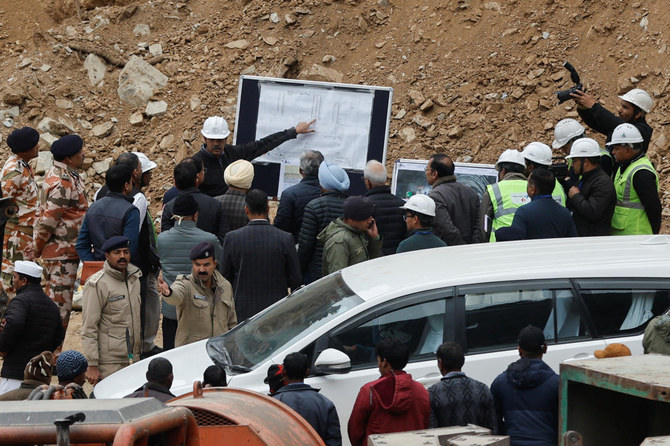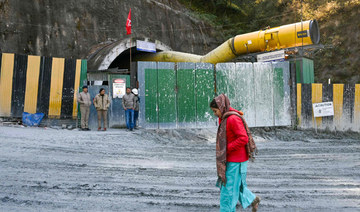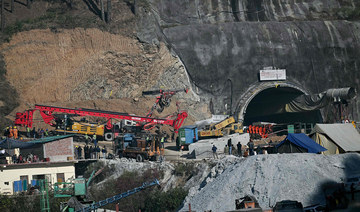UTTARKASHI, India: India’s transportation minister says all 41 construction workers who were trapped in a collapsed mountain tunnel in the country’s north for more than two weeks have been pulled out after rescuers reached them on Tuesday.
Nitin Gadkari, the minister of road transport and highways, said on X, formerly known as Twitter, that he was “completely relieved and happy” after all were rescued from the Silkyara Tunnel in Uttarkashi after an ordeal that lasted 17 days.
“I am very happy that all the 41 trapped workers have come out and their lives have been saved,” he said in a video message posted on X. Gadkari added that “this was a well-coordinated effort by multiple agencies, marking one of the most significant rescue operations in recent years.”
Cheers and jubilation erupted as rescuers in India reached 41 construction workers who were trapped in a collapsed mountain tunnel for over two weeks in the country’s north and started pulling them out, officials said earlier during the day.
After less than an hour, Kirti Panwar, a government spokesperson, said 34 workers had been rescued so far. “All are safe and sound,” he said.
The workers were being pulled out through a passageway made of welded pipes which rescuers previously pushed through dirt and rocks. They will each go through an initial health checkup at a temporary medical camp set up inside the 13-meter (42.6 feet) wide tunnel.
As the first worker was pulled out, Pushkar Singh Dhami, the top elected official in the state of Uttarakhand, presented him with a garland and hung it around his neck as rescuers, other officials and relatives cheered.
A crowd of locals shouted slogans of “Bharat Mata ki Jai,” or “Long live mother India,” and set off firecrackers.
One of the rescuers, Devender, who only gave his first name, told the New Delhi Television channel that “the trapped workers were overjoyed when they spotted us in the tunnel. Some rushed toward me and hugged me.”
The massive rescue mission had grabbed the country’s attention for the past weeks. The workers got trapped on Nov. 12, when a landslide caused a portion of the 4.5-kilometer (2.8-mile) tunnel they were building in Uttarakhand state to collapse about 200 meters (650 feet) from the entrance.
They survived on food and oxygen supplied through narrow steel pipes.
“Soon all the laborer brothers will be taken out,” Pushkar Singh Dhami, top official in Uttarakhand, had posted on the social media platform X, formerly known as Twitter, earlier on Tuesday, when there were only a few feet remaining to be dug out.
Kirti Panwar, a state government spokesperson, said about a dozen men had worked overnight to manually dig through rocks and debris, taking turns to drill using hand-held drilling tools and clearing out the muck in what he said was the final stretch of the rescue operation.
Rescuers resorted to manual digging after the drilling machine broke down on Friday while drilling horizontally from the front because of the mountainous terrain of Uttarakhand. The machine bored through about 47 meters (nearly 154 feet) out of approximately the 57-60 meters (nearly 187-196 feet) needed, before rescuers started to work by hand to create a passageway to evacuate the trapped workers.
By Tuesday, they had drilled through more than 58 meters (190 feet). As dusk fell, families of those trapped underground gathered near the site of the accident, anxiously waiting to see their loved ones emerge from the tunnel.
Among them was Jaimal Singh who said he was hopeful he would soon see his brother Gabbar Singh, who is trapped inside. “Even nature looks cheerful today ... the weather is good. Let’s hope this ends soon,” he told the Press Trust of India news agency.
Rescue teams had inserted pipes into dug-out areas and welded them together so the workers could be brought out on wheeled stretchers. On Sunday, rescuers also began to create a vertical channel with a newly replaced drilling machine as a contingency plan.
What began as a rescue mission expected to take a few days has turned into weeks, and officials have been hesitant to give a timeline for when it might be completed.
“I just feel good. The drilling on top of the mountain is coming along perfectly, in the tunnel, it’s coming along very well. I have never said ‘I feel good’ before,” Arnold Dix, an international tunneling expert who is helping with the rescue, told reporters at the site earlier on Tuesday.
Most of the trapped workers are migrant laborers from across the country. Many of their families have traveled to the location, where they have camped out for days to get updates on the rescue effort and in hopes of seeing their relatives soon.
Authorities have supplied the trapped workers with hot meals through a 6-inch (15-centimeter) pipe after days of surviving only on dry food sent through a narrower pipe. They were getting oxygen through a separate pipe, and more than a dozen doctors, including psychiatrists, have been at the site monitoring their health.
The tunnel the workers were building was designed as part of the Chardham all-weather road, which will connect various Hindu pilgrimage sites. Some experts say the project, a flagship initiative of the federal government, will exacerbate fragile conditions in the upper Himalayas, where several towns are built atop landslide debris.
Large numbers of pilgrims and tourists visit Uttarakhand’s many Hindu temples, with the number increasing over the years because of the continued construction of buildings and roadways.



























